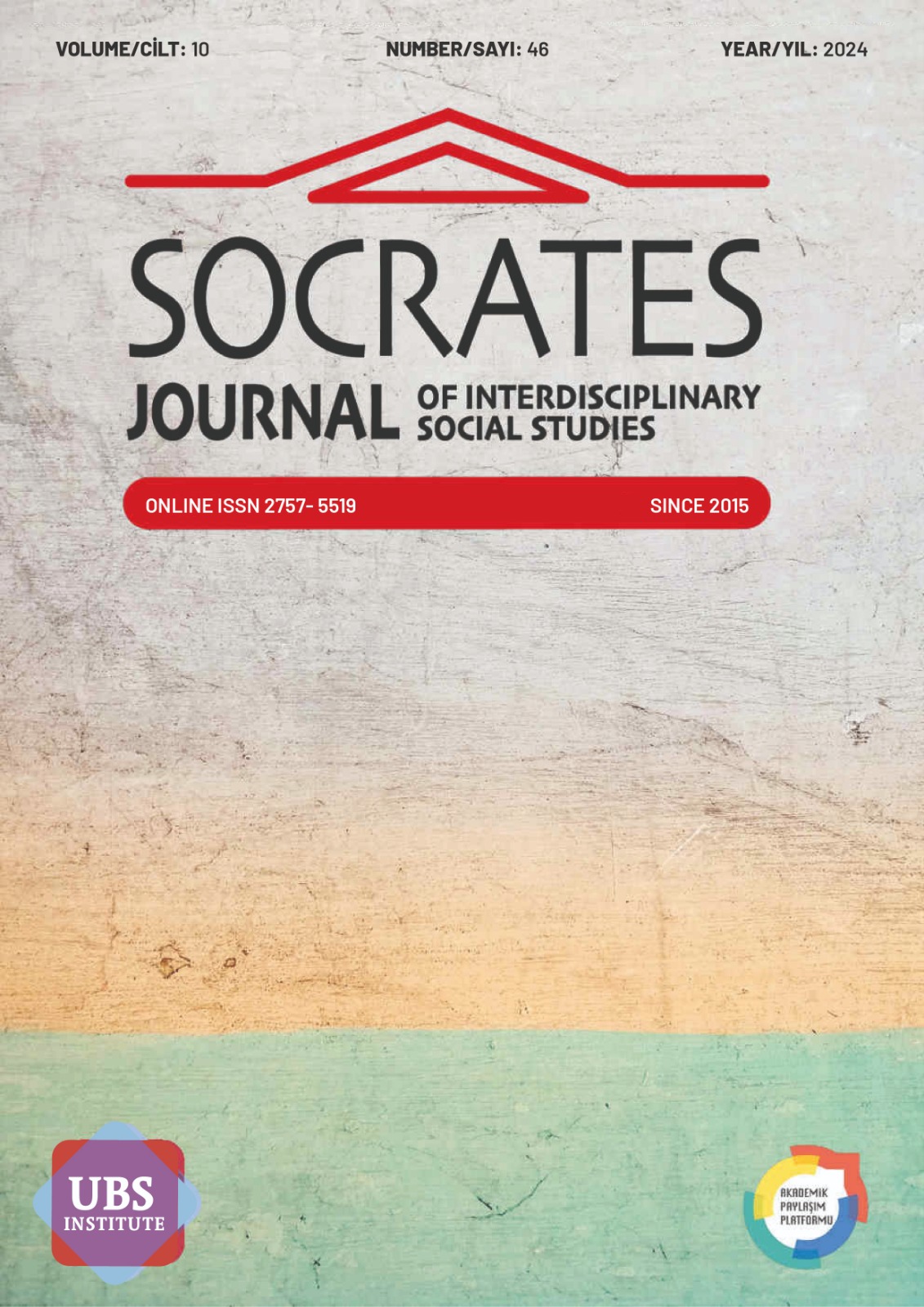TARİHSEL GELİŞİMDEN MEVCUT YAPIYA: TÜRKİYE’DE KAMU PERSONEL EĞİTİMİ
FROM HISTORICAL DEVELOPMENT TO CURRENT STRUCTURE: PUBLIC PERSONNEL EDUCATION IN TÜRKİYE
DOI:
https://doi.org/10.5281/zenodo.13889776Keywords:
Kamu Personeli, Eğitim, Nitelik, HizmetAbstract
The aim of the study is to examine the historical development and current structure of public personnel training in Turkey, to identify existing problems in this context and to develop solution proposals. The main asset of public administration is to provide public service to the society. In public administration, the production of public goods and services is carried out by public officials, in other words, public personnel. It constitutes the human element of public administration. It has very important functions in the implementation of public services and policies. Therefore, in order to provide a qualified public service in the public sector; Public personnel training should be taken into account and a great responsibility towards society should be implemented effectively and efficiently. When looked at within the historical process, public personnel training has a deep-rooted history from the Ottoman Empire to the present day. Practical and theoretical training was given at Enderun School, where public personnel training were given in the Ottoman Empire and the managerial class was trained. It was replaced by Mekteb-i Mülkiye in the second half of the 19th century. It has been observed that new institutions were built in public personnel training with the Republic. Nowadays, the public personnel needed by the state, where traditional structures have given way to modern structures, are met through universities. In the historical process, a significant change is evident and felt from the Enderun School, where a unique public personnel education was given by the West, to an educational structure modeled on the West. Looking at Turkish history, the institutions opened to train public personnel increased in proportion to the needs and took their current form. It has been determined that today, the institutional structure of public personnel training remains theoretical as a functioning shaped by existing institutions, and it cannot fully meet with practice. After identifying the problems encountered in the implementation of public personnel training, he pointed out that an original educational institution has not been established.
Keywords: Public, Public Personnel, Education, Service, Qualification, Yield.
References
Aksoy, E., & Özkan, F. (2023, 12 22). Türkiye'De Kamu Yönetimi Eğitiminin Mevcut Durumu ve Sorunlarına Yönelik Bir Çözümleme. Ekonomi İşletme Siyaset ve Uluslararası İlişkiler Dergisi, 9(2), 218-228.
Arslan, E. (2021). Bürokrasiye Eleman Yetiştiren Yöneticilik Okulu Olarak Enderun Mektebi : Kurumsal Bir Değerlendirme. Kahramanmaraş Sütçü İmam Üniversitesi Sosyal Bilimler Dergisi, 18(2), 940-964.
Aslan, O. E. (2005). Kamu Personel Rejimi. Ankara: Todaie Yayınları.
Balta, T. B. (1966). Kamu Personelinin Eğitimi. Ankara: SBF Yayınları.
Bilgin, K. U. (2015). Kamu Yönetimi Eğitimi Geçmişten Geleceğe Küresel ve Ulusal Perspektifler. Bursa: Ekin Basım Yayın Dağıtım.
Can, E. (2011). Türkiye'de Kamu Personelinin Hizmetiçi Eğitiminde Bilişim Teknolojilerinin Rolü. Yüksek Lisans Tezi. İzmir, Türkiye: Dokuz Eylül Üniversitesi Sosyal Bilimler Enstitüsü Kamu Yönetimi Anabilim Dalı.
CBİKO. (2023). Türkiye Yeni Yüzyılın Yetenek Üssü : 2018-2023 Faaliyet Raporu. Ankara: Türkiye Cumhuriyeti Cumhurbaşkanlığı İnsan Kaynakları Ofisi.
Çevikbaş, R. (2002). Hizmet İçi Eğitim ve Tük Merkezi Yönetimindeki Uygulaması. Ankara: Nobel Yayınları.
Demirci, A. (2015). ''Enderun'dan Mülkiye'ye Osmanlı İmparatorluğunda Mülki İdarecinin Eğitimi'', Kamu Yönetimi Eğitimi Geçmişten Geleceğe Küresel Perspektifler. Ankara: Ekin Yayınları.
Demirci, S. (1989). Kamu Personel Eğitimi ve Üniversite Hizmetiçi Eğitim Politikası. Doktora Tezi. İstanbul, Türkiye: Marmara Üniversitesi Sosyal Bilimler Enstitüsü Kamu Yönetimi Bölümü Siyaset ve Sosyal Bilimler Anabilim Dalı.
Dunsire, A. (1999). ''Then and Now Public Administration : 1953-1999''. Political Studies, 360-378.
Eryılmaz, B. (2002). Kamu Yönetimi. İstanbul: Erkam Matbaası.
Eryılmaz, B. (2017). Kamu Yönetimi (10.Baskı b.). Kocaeli: Umuttepe Yayınları.
Eryılmaz, B. (2019). Kamu Yönetimi. Eskişehir: Anadolu Üniversitesi.
Hatipoğlu, S. (2019, Eylül). Kamuda Hizmet Öncesi Eğitiminin İş Meslek Uyumu, Mesleki Aidiyet İle İşten Ayrılma Niyetine Etkisi : İnfaz ve Koruma Memurları Örneği. Yüksek Lisans Tezi. Ankara, Türkiye: Ankara Hacı Bayram Veli Üniversitesi Lisansüstü Eğitim Enstitüsü.
Kağan, M., & Yalçın, S. (2019). Eğitime Giriş. Ankara: Pegem Akademi.
Karasu, K. (2001). Profesyonelleşme Olgusu ve Kamu Yönetimi. Ankara: Mülkiyeliler Birliği Yayınları Tezler Dizisi.
Kaş, B., & Köktürk, Ş. (2021, 08 30). Akademik Çeviri Programları Kapsamında Eğitim, Öğretim, Eğitim Programı ve Öğretim Programı Kavramlarının Değerlendirilmesi. Toplum ve Kültür Araştırmaları Dergisi(8), 96-110.
Kocaoğlu, M., & Özmen, Z. N. (2019). Türkiye'deki Kamu Yönetimi Eğitimi ve Personel İstihdam Etme Usullerinin Kamu Personeli Seçme Sınavı Üzerinden Değerlendirilmesi. Erciyes Üniversitesi Sosyal Bilimler Enstitüsü Dergisi, 241-266.
Köse, D., & Parlak, A. (2023). Etik kavramı Çerçevesinde Türk Kamu Yönetiminde Kamu Etiği. Smart Journal, 3474-3482.
Kurban, S. (2016). Tanzimat Sonrası Dönemden Günümüze Üst Düzey Yönetici Eğitimi. Bilecik Şeyh Edebali Üniversitesi Sosyal Bilimler Enstitüsü, 1(1), 71-81.
Kuyaksil, A. (1995). Personel Eğitimi ve Türkiye. Türk İdare Dergisi, 159-177.
Metin, M., & Özcan, A. (2015). Eğitim İle İlgili Temel Kavramlar. Yozgat: Bozok Üniversitesi.
Mevuzat. (2009, 12 11). Sağlık Bakanlığı Hizmet İçi Eğitim Yönetmeliği. 04 10, 2024 tarihinde www.sağlık.gov.tr web sitesi: https://dosyasb.saglik.gov.tr/Eklenti/279/0/hieyonetmelikpdf.pdf?_tag1=C339AB31601F8788C7E99E9F0226615A447DD924 adresinden alındı
Mevzuat. (1965, 07 23). Devlet Memurları Kanunu. 04 10, 2024 tarihinde www.mevzuat.gov.tr web sitesi: https://www.mevzuat.gov.tr/mevzuat?MevzuatNo=657&MevzuatTur=1&MevzuatTertip=5 adresinden alındı
Mevzuat. (1965). Kaymakam Adayları Yönetmeliği. 04 10, 2024 tarihinde www.mevzuat.gov.tr web sitesi: https://www.mevzuat.gov.tr/anasayfa/MevzuatFihristDetayIframe?MevzuatTur=7&MevzuatNo=15092&MevzuatTertip=5 adresinden alındı
Mevzuat. (2006). Emniyet Genel Müdürlüğü Hizmetiçi Eğitim Yönetmeliği. 04 10, 2024 tarihinde www.mevzuat.gov.tr web sitesi: https://www.mevzuat.gov.tr/File/GeneratePdf?mevzuatNo=9184&mevzuatTur=KurumVeKurulusYonetmeligi&mevzuatTertip=5 adresinden alındı
Ömürgönülşen, U. (2010). Türkiye'de Lisans Düzeyi Kamu Öğretiminde Yakın Dönemde Yaşanan Gelişmeler : Mevcut Durum, Sorun Alanları ve Gelişme Eğilimleri. Ankara Üniversitesi SBF Dergisi, 65(3), 123-162.
Özdemir, H. (2001). Osmanlı Devletinde Bürokrasi. İstanbul: Okumuş Adam Yayınları.
Peker, K. (2010). Kamu Kurum ve Kuruluşlarında Hizmet İçi Eğitim ve Yöntemleri. Mevzuat Dergisi(156), 1-17.
Uysal, Y., & Atmaca, Y. (2020). Üniversite Öğrencilerinin Kamu Personeli ve Kamu Personel Sistemi Algılarını Ölçmeye Yönelik Bir Analiz : Gediz Meslek Yüksekokulu Örneği. Journal of Awareness, 5, 463-484.
Yıldırım, A. (2023). Türkiye'de Kamu Yönetimi Eğitimi Üzerine Bir Çözümleme. Bilecik Şeyh Edebali Üniversitesi Sosyal Bilimler Dergisi, 8(1), 1-10.
Downloads
Published
How to Cite
Issue
Section
License
Copyright (c) 2024 Socrates Journal of Interdisciplinary Social Studies

This work is licensed under a Creative Commons Attribution 4.0 International License.


